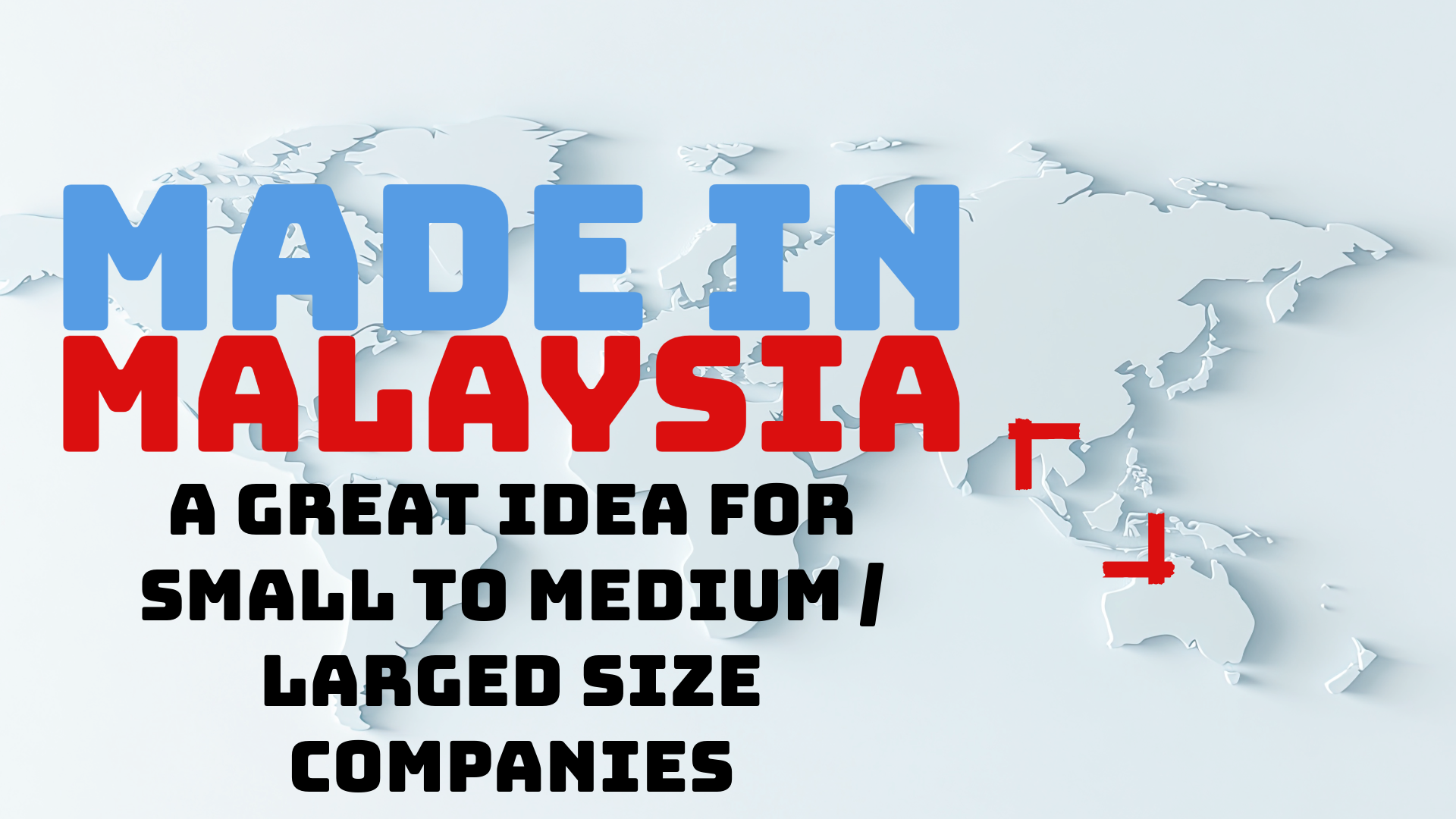In today’s competitive global market, companies of all sizes are looking for ways to optimize their manufacturing processes. For startups and medium-sized businesses, outsourcing production can be a cost-effective solution. Among the various outsourcing destinations, Malaysia stands out as an ideal location for manufacturing due to its combination of cost efficiency, high-quality production, and a skilled workforce.
But what makes Made in Malaysia a great idea for startups to medium / Large sized companies? In this article, we’ll explore the reasons why outsourcing manufacturing to Malaysia is an attractive option for businesses looking to scale.
Advantages of Manufacturing in Malaysia
- Skilled Labor
One of the main reasons companies turn to Malaysia for manufacturing is the availability of a highly skilled workforce. The country is home to a vast pool of engineers, technicians, and specialized workers trained in industries such as electronics, automotive, and medical devices. The education system and training programs have produced a workforce adept in modern manufacturing techniques, ensuring that companies benefit from both skilled labor and cost-effective wages compared to other global manufacturing hubs.
- Ease of Doing Business
Malaysia consistently ranks high in terms of ease of doing business. According to the World Bank, the country’s transparent regulatory environment, investor-friendly policies, and efficient procedures make it easy for foreign businesses to set up operations. The quick approval process for business licenses, as well as access to government incentives and grants, makes Malaysia an attractive place for businesses looking to reduce bureaucracy and streamline their production process.
- Trust and Reliability
Malaysia has earned a strong reputation for its reliable and high-quality production. While some countries may be perceived as riskier or less consistent, Malaysia’s focus on quality control and adherence to international standards makes it a trusted destination for global companies. Whether producing consumer electronics, medical devices, or automotive parts, businesses can rely on manufacturers in Malaysia to deliver products that meet stringent quality requirements.
- Government Support
The Malaysian government offers a range of incentives to encourage foreign investment and manufacturing. These include tax incentives, grants, and support for research and development. Programs like the Incentive for Industry (Incentive for High-Tech and Knowledge-Based Industries) provide significant savings to companies that establish manufacturing operations in Malaysia, helping them to lower their initial investment costs and grow more efficiently.
- Cost Efficiency
Compared to other Southeast Asian countries, Malaysia offers a highly competitive cost structure. The country’s lower labor costs, efficient logistics, and affordable overhead expenses make it an attractive option for businesses that want to keep production costs low. In particular, Malaysia offers better value than Vietnam or Thailand, especially for industries requiring specialized labor like electronics or medical devices.
History with Trade
Malaysia’s history as a global trading hub dates back centuries, shaped by its strategic location along the Strait of Malacca, one of the world’s busiest maritime routes. As early as the 1st century, the Malay Peninsula was a key stop for traders from China, India, and the Arab world, exchanging goods like spices, silk, and precious metals. By the 15th century, the Malacca Sultanate rose to prominence, facilitating trade between the East and West. Portuguese, Dutch, and British colonizers later vied for control of this vital region, highlighting its significance in global commerce.
Today, Malaysia remains a major player in international trade. In 2022, it ranked 24th globally in total exports, valued at approximately $373 billion. Key exports include electronics, palm oil, and liquefied natural gas. The country’s trade-to-GDP ratio often exceeds 130%, underscoring its heavy reliance on global markets. As a founding member of ASEAN and participant in trade agreements like RCEP, Malaysia continues to leverage its historical legacy to thrive in the modern global economy.
Made in Malaysia: Successful Products
Malaysia is known for its diverse manufacturing capabilities, producing everything from consumer electronics to medical devices and B2B products.
Here are some examples of Made in Malaysia products:
- Consumer Electronics
Laptops & Computers: Companies such as Dell and HP have set up manufacturing operations for computers, laptops, and accessories.
Televisions: Brands like LG and Samsung produce flat-screen TVs in Malaysia, benefiting from the country’s robust electronics industry.
- Medical Devices
Diagnostic Equipment: Malaysia has become a hub for the production of medical devices like diagnostic machines and equipment used in healthcare. Agilent, a premier measurement company has very successful history in Malaysia.
Surgical Instruments: High-precision surgical tools and instruments are made in Malaysia, adhering to international medical standards. Companies like B. Braun has been in Malaysia since 1972!
Wearable Health Technology: Malaysia is also a key producer of wearable devices such as fitness trackers and health monitors. Recently companies like Dexcom set up manufacturing facilities in Malaysia producing continuous glucose monitoring devices.
- Consumer-Facing Products
Home Appliances: Major global brands in the home appliance sector, such as Panasonic and Sharp, manufacture products in Malaysia, including refrigerators, washing machines, audio products and air conditioners.
Furniture: Malaysia is a major exporter of furniture, producing high-quality items for global retail markets.
Wearables: Companies like Fitbit and Garmin produce their wearable fitness trackers in Malaysia, ensuring both quality and efficiency.
- B2B Products
Industrial Equipment: Manufacturing machinery and components for industrial applications are also produced in Malaysia.
Automotive Parts: Malaysia is home to international automotive companies like Bosch and Continental, which produces parts and components for vehicles.
Electrical Components: Companies in the electrical sector rely on Malaysia for the production of circuit boards, wires, and other essential parts.
Well-Known International Companies Manufacturing in Malaysia
Malaysia has attracted numerous international companies due to its manufacturing advantages. Here’s a list of some of the well-known companies that have successfully set up operations in Malaysia:
- Intel: Leading semiconductor manufacturer.
- Bosch: Produces automotive parts and electronics.
- Samsung: Manufacturer of smartphones, tablets, and consumer electronics.
- Philips: Medical devices and home healthcare products.
- Siemens: Industrial equipment and automation technology.
- Sony: Consumer electronics, including TVs, cameras, and entertainment devices.
- Dell: Computers and laptops.
Did you know that Porsche chose Malaysia as its first foreign assembly plant in the world?
Why Malaysia Over Alternatives Like Vietnam and Thailand?
While Vietnam and Thailand are emerging manufacturing hubs, Malaysia offers several advantages that make it a more attractive option for many companies:
Skilled Labor: Unlike Vietnam and Thailand, Malaysia has a highly specialized workforce, especially in industries like electronics, medical devices, and automotive parts. The country’s universities and technical institutions produce graduates equipped with the skills necessary for modern manufacturing.
Business Infrastructure: Malaysia boasts better infrastructure than its alternatives, with advanced transportation networks, modern logistics, and robust communication systems. This ensures a smoother flow of goods and services.
Proximity to Suppliers: Malaysia’s location in Southeast Asia places it closer to key suppliers in the region, which helps reduce lead times and shipping costs.
Government Support: Malaysia’s government policies are highly conducive to foreign investment. Compared to Vietnam and Thailand, Malaysia offers better access to tax incentives, grants, and financial support for foreign businesses looking to set up manufacturing operations. Hear it from our trade minister as well!
Think of Malaysia as the gateway to Southeast Asia.

Conclusion
In conclusion, Made in Malaysia is an increasingly attractive option for startups and medium-sized companies looking to outsource their manufacturing needs. With a skilled workforce, cost-effective solutions, and a highly reliable manufacturing environment, Malaysia offers several advantages over other regions, including Vietnam and Thailand. The country’s business-friendly policies, quality control standards, and access to international suppliers make it a perfect choice for companies looking to scale their operations while maintaining high production standards.
If you’re considering outsourcing your manufacturing needs, Malaysia should be at the top of your list.
